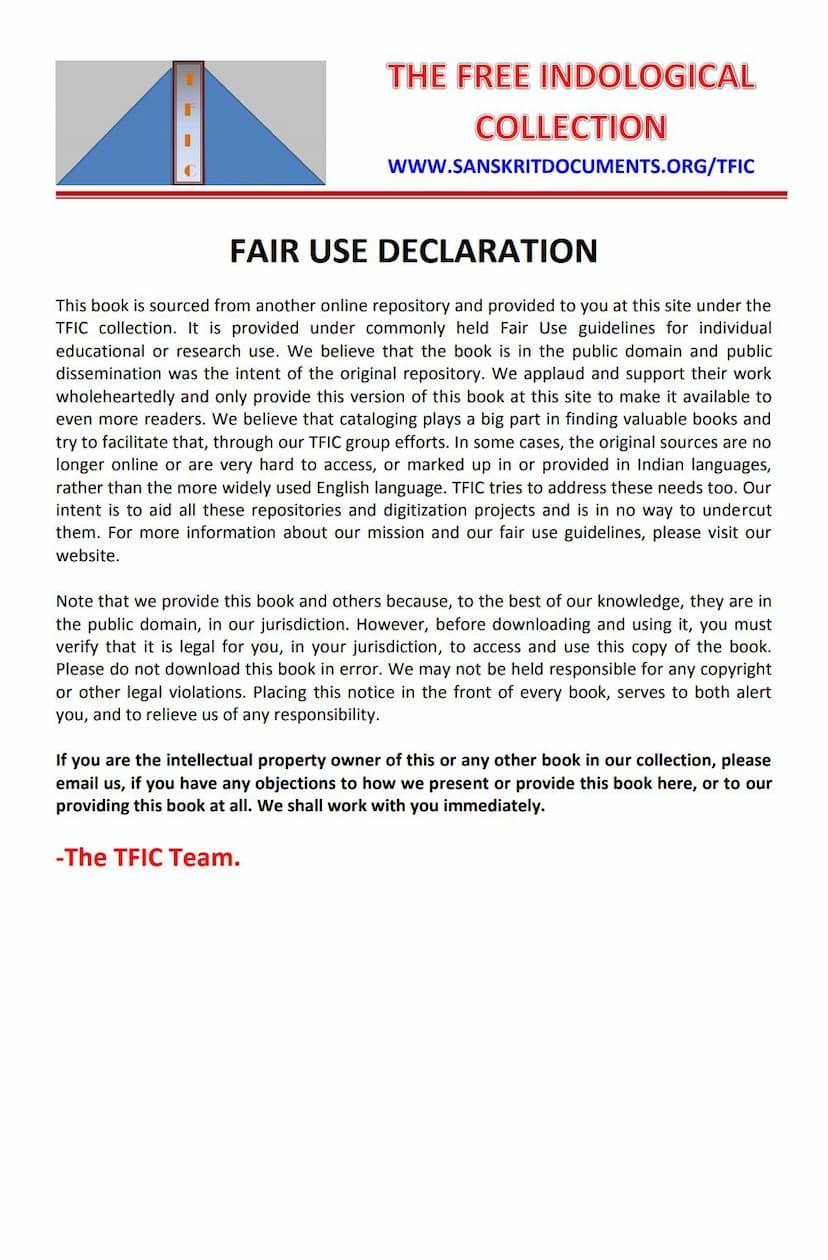Chatvara Karmgranth
Added to library: September 1, 2025

Summary
This is a comprehensive summary of the Jain text "Chatvara Karmgranth" by Chaturvijay, published by Atmanand Jain Sabha, based on the provided pages.
Book Title: Chatvara Karmgranth (Four Books on Karma) Author: Muni Chaturvijay (Disciple of Acharya Shri Devenra Suri) Publisher: Shri Jain Atmanand Sabha, Bhavnagar Publication Date: Vikram Samvat 1990 (1934 CE) Language: Prakrit (with Sanskrit commentary by Acharya Shri Devendra Suri)
Overview:
The "Chatvara Karmgranth" is a collection of four significant Jain texts on the intricate doctrine of Karma, authored by Muni Chaturvijay. These texts are based on the profound teachings of the great Acharya Shri Devendra Suri, a prominent figure of the Brihat Tapagachchha. The work is a meticulous compilation and critical edition, aiming to present these complex philosophical treatises in a clear and accessible manner for scholars and practitioners of Jainism.
Key Features of the Edition:
- Authoritative Text: The edition is based on a careful study of various ancient palm-leaf and manuscript copies, ensuring accuracy and authenticity.
- Commentary: The first, second, and fourth Karmagranthas are presented with their original commentaries (Swopagya Vivaran) by Acharya Shri Devendra Suri. The third Karmagranth is accompanied by a commentary (Avachuri-rup Tika) from another esteemed Acharya.
- Editorial Work: The editor, Muni Chaturvijay, a learned disciple of Acharya Shri Atmaramji Maharaj (Shri Kantivijay), has diligently worked on the manuscripts, providing extensive annotations, cross-references to scriptural sources, and appendices.
- Appendices: The book includes six appendices that enhance its scholarly value:
- Index of Scriptural Citations: Location references for scriptural passages cited by the commentator.
- Index of Works Mentioned: An index of texts and authors referenced in the commentary.
- Glossary of Technical Terms: An index of specialized terms from the Karmagranthas and their explanations.
- Index of Pind-Prakriti: A glossary of terms related to "Pind-Prakriti" (a classification of karmic sub-categories).
- Comparative Study of Karma Literature: A survey of available Shvetambar and Digambar literature on Karma.
- Dedication: The publication is dedicated to the scholars and followers of the Brihat Tapagachchha lineage, highlighting the importance of these texts.
- Financial Support: The publication acknowledges financial contributions from various devout individuals, particularly highlighting the support received from benevolent women, reflecting the community's dedication to preserving Jain scriptures.
The Four Karmagranthas (and their content):
The book presents four of Acharya Shri Devendra Suri's Karmagranthas. While the introduction mentions five works by him in total, this volume focuses on four. The preface provides a detailed description of each of these four texts:
- Karma-Vipak (First Karmagranth): This text elaborates on the nature of the eight types of Karma (Jnanavaraniya, Darshanavaraniya, etc.), their various subdivisions, and their consequences (Vipak) or fruits, often explained through illustrative examples.
- Karma-Stav (Second Karmagranth): This work praises Lord Mahavir Swami. Through this praise, it details the nature of the fourteen Gunasthanas (stages of spiritual development) and the specific karmic tendencies (Prakriti) that are bound, active (Uday), released (Udirana), and remain in existence (Satta) at each stage.
- Bandha-Swamitva (Third Karmagranth): This text explores the "Bandha-Swamitva," which refers to the ownership or characteristic of karmic bondage. It analyzes this based on different Marganasthanas (categories of existence and spiritual inquiry) such as Gati (modes of existence), Indriya (senses), Kaya (body types), Yoga (activity types), Veda (gender tendencies), Kashaya (passions), Jnana (knowledge types), Sanyama (restraint types), Darshana (perception types), and Laya (karmic shades).
- Shad-ashiti (Fourth Karmagranth): The title "Shad-ashiti" refers to the eighty-six verses (or related number, often indicating a specific length or subject matter). This text delves into ten main topics: Jiva-sthana (categories of souls), Margana-sthana (categories of inquiry), Gunasthana (stages of spiritual development), upayog (consciousness type), yoga (types of activity), laya (karmic shades), bandha (karmic bondage), alpabahutva (relative quantities), bhava (states of being), and sankhya (numbers). It provides detailed analyses of these subjects, with a particular focus on the intricacies of Laya and the relationships between these concepts.
Significance and Importance:
The introduction highlights the immense importance of the Karmagranthas in understanding Jain philosophy. It states that a true and complete comprehension of Jainism and its scriptures is impossible without grasping the concept of Karma. These texts are presented as essential preliminary tools for entering the vast ocean of Jain Karma literature, such as Karma-Prakriti and Pancha-Sangraha.
Author and Time Period:
Muni Chaturvijay is a disciple of Acharya Shri Atmaramji Maharaj, who was a disciple of Acharya Shri Devenra Suri. Acharya Shri Devendra Suri himself was a prominent figure of the Brihat Tapagachchha, a lineage founded by Acharya Shri Jagachandra Suri. The preface indicates that Muni Chaturvijay was a learned scholar, well-versed in various philosophical schools, and dedicated to making complex texts accessible. Acharya Shri Devendra Suri lived around the 13th-14th century Vikram Samvat.
Editorial Approach:
The editor, Muni Chaturvijay, expresses his gratitude to his knowledgeable disciple, Muni Shri Punyavijay Maharaj, for his significant contribution to the editing and refinement of the text. The editor emphasizes the rigorous process of collation and comparison of various ancient manuscripts to ensure the highest level of accuracy. The editor also notes the effort made to explain the scriptural proofs cited by the commentators and to provide additional appendices to enrich the reader's understanding. The text aims to present the material in a well-structured manner with paragraphs for better readability, unlike earlier editions where the commentary was printed continuously.
Overall Value:
"Chatvara Karmgranth" is presented as a monumental work that aims to provide a clear, accurate, and comprehensive understanding of Jain Karma philosophy. It serves as a vital resource for both academic study and spiritual practice, offering a deep dive into one of the most fundamental and complex aspects of Jain doctrine. The meticulous editorial work and the inclusion of valuable appendices make it a cornerstone for anyone seeking to study Jain Karma.